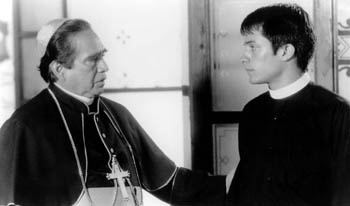![[Metroactive Movies]](/movies/gifs/movies468.gif)
[ Movies Index | Show Times | Silicon Valley | Metroactive Home | Archives ]
Wafer Clause
'The Crime of Father Amaro' is a justly popular--and scandalous--melodrama from Mexico
By Richard von Busack
OLD-FASHIONED MELODRAMA still has potential as a device for social criticism. Just check out the reverent critical treatment of Far From Heaven, which is based on the idea that it has a lot to tell us about how cinema can fight intolerance. Instead of Todd Haynes' chilly repast, however, some might prefer a spicy, gravy-covered dish of the old school titled The Crime of Father Amaro. Director Carlos Carrera's story of sin was ripe enough to rouse the Catholic Church's wrath in Mexico when the film was released. As John Waters noted of the Catholic protesters causing a hubbub around Jean-Luc Godard's intractable Hail Mary, "With the pope as your press agent, you are bound to stir up a little interest."
You can quarrel with the thickness of fate in the film, perhaps because fate doesn't get so thick in North America. The hunky Gael García Bernal of Y Tu Mamá También plays a new young priest in a small city in central Mexico. Padre Amaro is an eager-to-please kid who is taken into the venal power structure. His superior, Father Benito (the Fernando Rey-like Sancho Gracía), is sleeping with the owner of a local restaurant. The owner's daughter is the gorgeous but pious young Amelia (Ana Claudia Talancón), who fixates on Amaro and makes the adolescent's typical mistake of confusing the stirrings of passion with religious ecstasy. While Amaro becomes more popular, his fellow priest falls: Father Natalio (Damían Alcázar) sees his duty to minister to the rebels in the hills and is excommunicated for his devotion.
One point that distinguishes the melodrama from the drama is a hero (or heroine) of such total innocence that the worst befalls them with ease. The Crime of Father Amaro boasts two such innocents as leads. Amaro is willing to argue that all love is sacred, even as he's going out to seduce Amelia--even in a moment where he wraps his beloved in the blue spangled robes meant for a statue of the Virgin Mary.
Meanwhile, a deranged hag who has been haunting the film, Dionisia (the cackling Luisa Huertas), turns up to give the screw a final turn. Dionisia is the star of the film's most notorious scene, in which a sacred host is fed to a cat. But Dionisia is no deliberate blasphemer: it's just that her kitty is sick, and the old bat believes the wafer will make her pet well. Misreading a film this essentially moral is the job of the powerful. The Crime of Father Amaro makes a convincing argument that in the most backward and conservative parts of Latin America, the church can be one more pinion holding down the poor. It states that in the worst circumstances, the church can be a handmaid to organized criminals and a corrupt government. And it's an almost painfully eloquent plea for allowing the clergy to marry. Moreover, the film proposes situations of good and evil in which there is no middle ground--and isn't that catholic of it?
[ Silicon Valley | Metroactive Home | Archives ]
![]()

Fatherly Advice: The bishop (Ernesto Gómez Cruz) offers some words of wisdom to young Father Amaro (Gael García Bernal).
The Crime of Father Amaro (R; 120 min.), directed by Carlos Carrera, written by Vicente Leñero, photographed by Guillermo Granillo and starring Gael García Bernal, Ana Claudia Talancón and Luisa Hertas, opens Friday at Camera 3 in San Jose.
Send a letter to the editor about this story to letters@metronews.com.
From the November 21-27, 2002 issue of Metro, Silicon Valley's Weekly Newspaper.